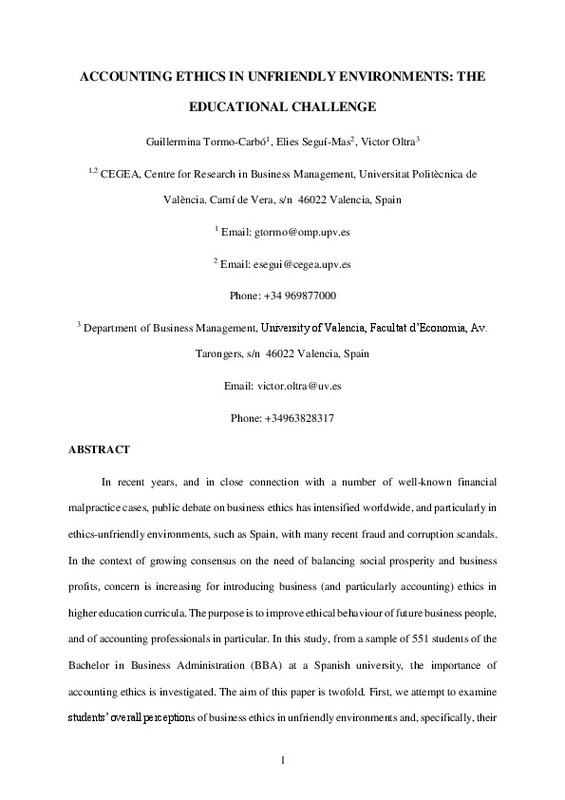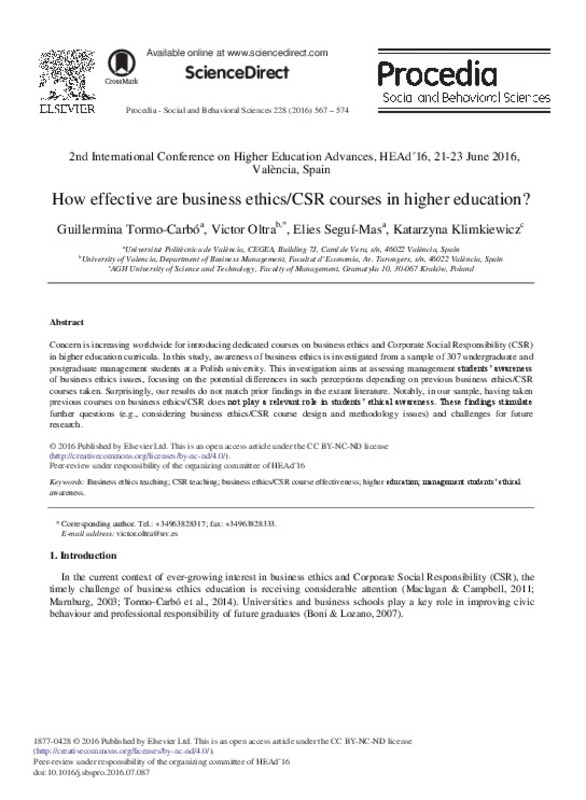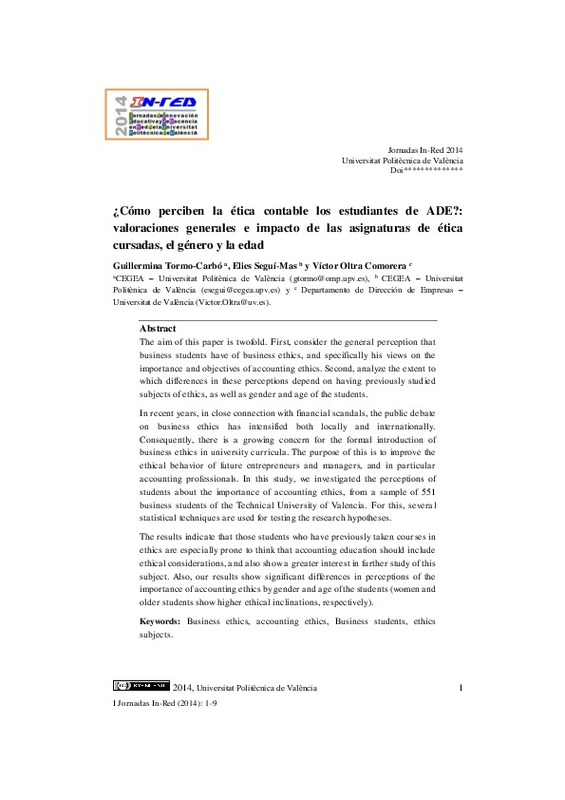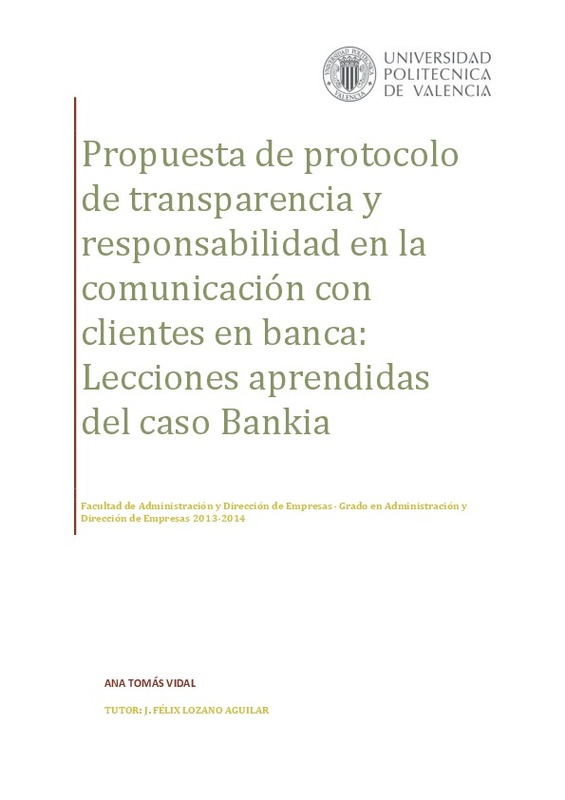Adkins, N., & Radtke, R. R. (2004). Students’ and faculty members’ perceptions of the importance of business ethics and accounting ethics education: Is there an expectations gap? Journal of Business Ethics, 51(3), 279–300.
Ajzen, I., Brown, T. C., & Carvajal, F. (2004). Explaining the discrepancy between intentions and actions: The case of hypothetical bias in contingent valuation. Personality and Social Psychology Bulletin, 30(9), 1108–1121.
Ajzen, I., & Madden, T. J. (1986). Prediction of goal-directed behavior: Attitudes, intentions, and perceived behavioral control. Journal of Experimental Social Psychology, 22(5), 453–474.
[+]
Adkins, N., & Radtke, R. R. (2004). Students’ and faculty members’ perceptions of the importance of business ethics and accounting ethics education: Is there an expectations gap? Journal of Business Ethics, 51(3), 279–300.
Ajzen, I., Brown, T. C., & Carvajal, F. (2004). Explaining the discrepancy between intentions and actions: The case of hypothetical bias in contingent valuation. Personality and Social Psychology Bulletin, 30(9), 1108–1121.
Ajzen, I., & Madden, T. J. (1986). Prediction of goal-directed behavior: Attitudes, intentions, and perceived behavioral control. Journal of Experimental Social Psychology, 22(5), 453–474.
ANECA. (2005). Libro Blanco del Grado en Economía y Empresa. Last Accessed October 2, 2014, from http://www.aneca.es/var/media/150292/libroblanco_economia_def.pdf .
Auger, P., & Devinney, T. M. (2007). Do what consumers say matter? the misalignment of preferences with unconstrained ethical intentions. Journal of Business Ethics, 76(4), 361–383.
Baetz, M. C., & Sharp, D. J. (2004). Integrating ethics content into the core business curriculum: Do core teaching materials do the job? Journal of Business Ethics, 51(1), 53–62.
Bampton, R., & Cowton, C. (2013). Taking stock of accounting ethics scholarship: A review of the journal literature. Journal of Business Ethics, 114(3), 549–563.
Bampton, R., & Maclagan, P. (2005). Why teach ethics to accounting students? A response to the sceptics. Business Ethics: A European Review, 14(3), 290–300.
Bardi, A., & Schwartz, S. H. (2003). Values and behavior: Strength and structure of relations. Personality and Social Psychology Bulletin, 29(10), 1207–1220.
Bernardi, R. A., & Bean, D. F. (2010). Ranking North American accounting scholars publishing ethics research: 1986 through 2008. In C. Jeffrey (Ed.), Research on professional responsibility and ethics in accounting (Vol. 14, pp. 139–174). Bingley: Emerald Group Publishing.
Borkowski, S. C., & Ugras, Y. J. (1992). The ethical attitudes of students as a function of age, sex and experience. Journal of Business Ethics, 11(12), 961–979.
Carauna, A., & Ewing, M. T. (2000). The effect of anomie on academic dishonesty of university students. The International Journal of Educational Management, 14(1), 23–29.
Cardona, F. (2014, March 14). Spain must combat corruption in local government. The Guardian. Last accessed October 2, 2014, from http://www.theguardian.com/local-government-network/2014/mar/04/spain-corruption-local-government .
Carrigan, M., & Attalla, A. (2001). The myth of the ethical consumer—do ethics matter in purchase behaviour? Journal of Consumer Marketing, 18(7), 560–578.
Chung, J., & Monroe, G. (2003). Exploring social desirability bias. Journal of Business Ethics, 44(4), 291–302.
Clarkeburn, H. (2002). A test for ethical sensitivity in science. Journal of Moral Education, 31(4), 439–453.
Cohen, J. R., & Martinov Bennie, N. (2006). The applicability of a contingent factors model to accounting ethics research. Journal of Business Ethics, 68(1), 1–18.
Cohen, J. R., & Pant, L. W. (1989). Accounting educators’ perceptions of ethics in the curriculum. Issues in Accounting Education, 4(1), 70–81.
Cohen, J. R., Pant, L. W., & Sharp, D. J. (2001). An examination of differences in ethical decision-making between Canadian business students and accounting professionals. Journal of Business Ethics, 30(4), 319–336.
Coicaud, J. M., & Warner, D. (Eds.). (2001). Ethics and international affairs: Extent and limits. New York: United Nations University Press.
Crane, F. G. (2004). The teaching of business ethics: An imperative at business schools. Journal of Education for Business, 79(3), 149–151.
Crossan, M., Mazutis, D., & Seijts, G. (2013). In search of virtue: The role of virtues, values and character strengths in ethical decision making. Journal of Business Ethics, 113(4), 567–581.
Dalton, D., & Ortegren, M. (2011). Gender differences in ethics research: The importance of controlling for the social desirability response bias. Journal of Business Ethics, 103(1), 73–93.
Dellaportas, S. (2006). Making a difference with a discrete course on accounting ethics. Journal of Business Ethics, 65(4), 391–404.
Duff, A. (2004). The role of cognitive learning styles in accounting education: Developing learning competencies. Journal of Accounting Education, 22(1), 29–52.
Eagly, A. H. (1987). Sex differences in social behaviour: A social-role interpretation. Hillsdale, NJ: Erlbaum.
Eagly, A. H., & Steffen, V. J. (1984). Gender stereotypes stem from the distribution of women and men into social roles. Journal of Personality and Social Psychology, 46(4), 735.
El País. (2014, May 29). Spanish court makes first conviction of bankers since start of crisis. Last accessed October 2, 2014, from http://elpais.com/m/elpais/2014/05/29/inenglish/1401376120_835701.html .
Fernández Fernández, J. L., & Bajo Sanjuán, A. (2011). The presence of business ethics and CSR in the higher education curricula for executives. Journal of Business Ethics Education, 7, 25–38.
Fritzsche, D. J., & Oz, E. (2007). Personal values’ influence on the ethical dimension of decision making. Journal of Business Ethics, 75(4), 335–343.
Gaa, J. C., & Thorne, L. (2004). An introduction to the special issue on professionalism and ethics in accounting education. Issues in Accounting Education, 19(1), 1–6.
Gallego-Alvarez, I. (2008). Analysis of social information as a measure of the ethical behavior of Spanish firms. Management Decision, 46(4), 580–599.
Ghaffari, F., Kyriacou, O., & Brennan, R. (2008). Exploring the implementation of ethics in UK accounting programs. Issues in Accounting Education, 23(2), 183–198.
Gollwitzer, P. M., & Sheeran, P. (2006). Implementation intentions and goal achievement: A meta-analysis of effects and processes. Advances in Experimental Social Psychology, 38, 69–119.
Graham, A. (2012). The teaching of ethics in undergraduate accounting programmes: The students’ perspective. Accounting Education, 21(6), 599–613.
Hannah, S. T., Avolio, B. J., & Walumbwa, F. O. (2011). Relationships between authentic leadership, moral courage, and ethical and pro-social behaviors. Business Ethics Quarterly, 21(4), 555–578.
Hooker, J. (2004). The case against business ethics education: A study in bad arguments. Journal of Business Ethics Education, 1(1), 75–88.
Hunt, S. D., & Vitell, S. (1986). A general theory of marketing ethics. Journal of Macromarketing, 6(1), 5–16.
Hurtt, R. K., & Thomas, C. W. (2008). Implementing a required ethics class for students in accounting: The Texas experience. Issues in Accounting Education, 23(1), 31–51.
Infoempleo. (2011). Informe de empleo sobre oferta y demanda de empleo cualificado en España. Madrid: Infoempleo/Adecco.
Jones, T. M. (1991). Ethical decision-making by individuals in organizations—an issue-contingent model. Academy of Management Review, 16(2), 366–395.
Kohlberg, L. (1969). Stage and sequence: The cognitive-developmental approach to socialization. In D. A. Goslin (Ed.), Handbook of socialization theory and research (pp. 347–480). Chicago: Rand McNally.
Lafer, G. (2005). The critical failure of workplace ethics’. In J. W. Budd & J. G. Scoville (Eds.), The ethics of human resources and industrial relations (pp. 273–297). Champaign, IL: Labor and Employment Relations Association.
Lau, C. L. (2010). A step forward: Ethics education matters! Journal of Business Ethics, 92(4), 565–584.
Lawson, R. (2004). Is classroom cheating related to business students’ propensity to cheat in the “real world?”. Journal of Business Ethics, 49(2), 189–199.
Loe, T., Ferrell, L., & Mansfield, P. (2000). A review of empirical studies assessing ethical decision making in business. Journal of Business Ethics, 25(3), 185–204.
Loo, R. (2003). Are women more ethical than men? Findings from three independent studies. Women in Management Review, 18(4), 169–181.
MacFarlane, B., & Ottewill, R. (2004). Business ethics in the curriculum: Assessing the evidence from UK subject review. Journal of Business Ethics, 54(4), 339–347.
Madden, T. J., Ellen, P. S., & Ajzen, I. (1992). A comparison of the theory of planned behavior and the theory of reasoned action. Personality and Social Psychology Bulletin, 18(1), 3–9.
Martinov-Bennie, N., & Mladenovic, R. (2013). An investigation into the impact of integrated educational interventions on first year accounting students’ ethical sensitivity and decision-making. In American Accounting Association’s 18th annual ethics research symposium, Anaheim, USA, 4 August 2013.
Mayer, D. M., Aquino, K., Greenbaum, R. L., & Kuenzi, M. (2012). Who displays ethical leadership, and why does it matter? An examination of antecedents and consequences of ethical leadership. Academy of Management Journal, 55(1), 151–171.
Mayhew, B. W., & Murphy, P. R. (2009). The impact of ethics education on reporting behaviour. Journal of Business Ethics, 86(3), 397–416.
Moore, C., & Gino, F. (2013). Ethically adrift: How others pull our moral compass from true North, and how we can fix it. Research in Organizational Behavior, 33, 53–77.
O’Fallon, M. J., & Butterfield, K. D. (2005). A review of the empirical ethical decision-making literature: 1996–2003. Journal of Business Ethics, 59(4), 375–413.
Phillips, H., & Bradshaw, R. (1993). How customers actually shop: Customer interaction with the point of sale. Journal of the Market Research Society, 35, 51–62.
Podsakoff, P. M., & Organ, D. W. (1986). Self-reports in organizational research: Problems and prospects. Journal of Management, 12(4), 531–544.
Rest, J. (1986). Moral development: Advances in research and theory. New York: Praeger.
Ross, W. T., & Robertson, D. C. (2003). A typology of situational factors: Impact on salesperson decision-making about ethical issues. Journal of Business Ethics, 46(3), 213–234.
Ruegger, D., & King, E. W. (1992). A study of the effect of age and gender upon student business ethics. Journal of Business Ethics, 11(3), 179–186.
Simkin, M. G., & McLeod, A. (2010). Why do college students cheat? Journal of Business Ethics, 94(3), 441–453.
Stedham, Y., Yamamura, J. H., & Beekun, R. I. (2007). Gender differences in business ethics: Justice and relativist perspectives. Business Ethics: A European Review, 16(2), 163–174.
Swenson-Lepper, T. (2005). Ethical sensitivity for organizational communication issues: Examining individual and organizational differences. Journal of Business Ethics, 59(3), 205–231.
The New York Times. (2013, July 8). Spaniards fight to get savings back. Last accessed October 2, 2014, from http://www.nytimes.com/2013/07/09/world/europe/spaniards-fight-to-get-savings-back.html?_r=1& .
Thorne, L. (1999). An analysis of the association of demographic variables with the cognitive moral development of Canadian accounting students: An examination of the applicability of American-based findings to the Canadian context. Journal of Accounting Education, 17(2–3), 157–174.
Transparency International. (2014a). Corruption Perceptions Index. Last accessed October 2, 2014, from http://www.transparency.org/research/cpi/ .
Transparency International. (2014b). Corruption Perceptions Index 2013. Last accessed October 2, 2014, from http://www.transparency.org/cpi2013/results .
Trevino, L. K. (1986). Ethical decision-making in organizations—a person-situation interactionist model. Academy of Management Review, 11(3), 601–617.
Trevino, L. K. (1992). Moral reasoning and business ethics: Implications for research, education, and management. Journal of Business Ethics, 11(5–6), 445–459.
Treviño, L. K., den Nieuwenboer, N. A., & Kish-Gephart, J. J. (2014). (Un) ethical behavior in organizations. Annual Review of Psychology, 65, 635–660.
Uysal, O. O. (2010). Business ethics research with an accounting focus: A bibliometric analysis from 1988 to 2007. Journal of Business Ethics, 93(1), 137–160.
Victor, B., & Cullen, J. B. (1988). The organizational bases of ethical work climates. Administrative Science Quarterly, 33(1), 101–125.
[-]







![[Cerrado]](/themes/UPV/images/candado.png)




